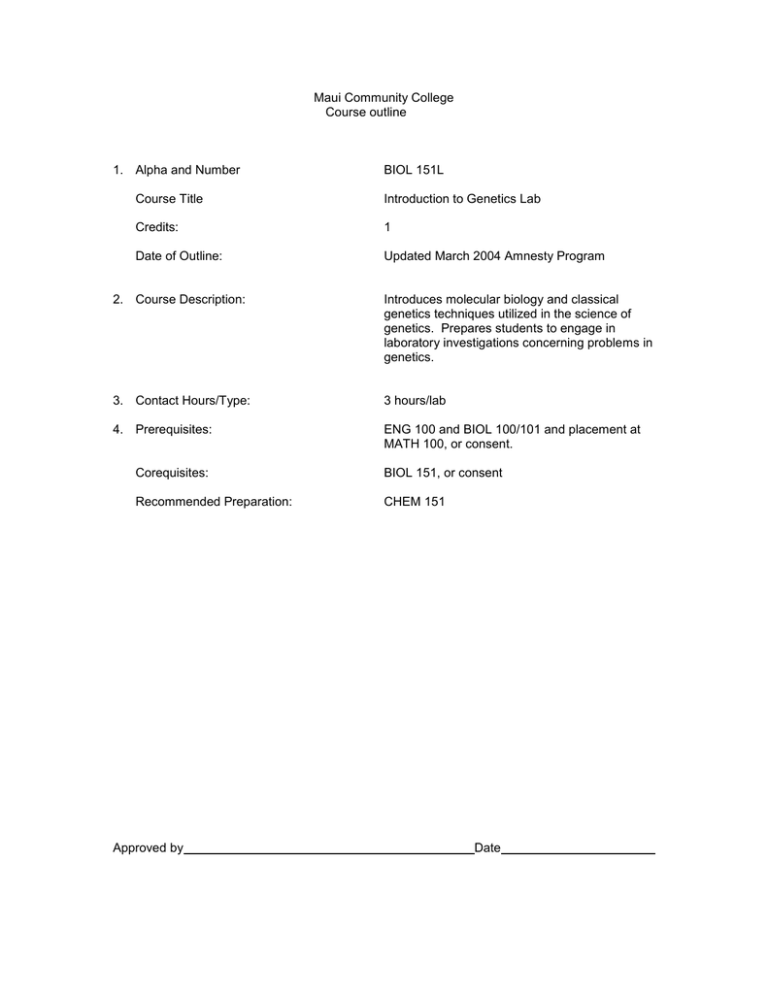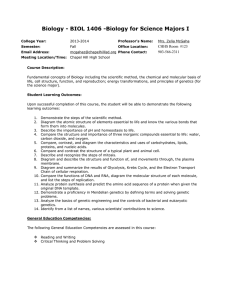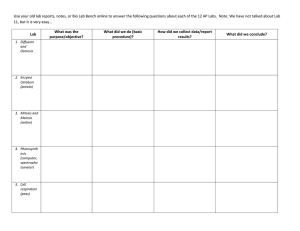Maui Community College Course outline 1. Alpha and Number
advertisement

Maui Community College Course outline 1. Alpha and Number BIOL 151L Course Title Introduction to Genetics Lab Credits: 1 Date of Outline: Updated March 2004 Amnesty Program 2. Course Description: Introduces molecular biology and classical genetics techniques utilized in the science of genetics. Prepares students to engage in laboratory investigations concerning problems in genetics. 3. Contact Hours/Type: 3 hours/lab 4. Prerequisites: ENG 100 and BIOL 100/101 and placement at MATH 100, or consent. Corequisites: BIOL 151, or consent Recommended Preparation: CHEM 151 Approved by Date 5. General Course Objectives: Goals: To introduce and develop laboratory skills and methods used in the study of genetics and molecular biology. General: To give students a chance to perform and analyze techniques used in a genetics or molecular biology laboratory. 6. Specific Course Objectives, Competencies, and Student Leaning Outcomes: For assessment purposes, these are linked to #7. Recommended Course Content. On successful completion of this course, students will be able to: a. b. c. d. e. apply the scientific method to answering some basic questions in genetics; implementation of basic mendelian principles in genetics; apply several examples of modern molecular (dna) biology techniques; utilized in human genetics research to some simple laboratory experiments; demonstrate knowledge in creating and maintaining a science lab notebook. 7. Recommended Course Content and Approximate Time Spent on Each Topic: Linked to #6. Student Learning Outcomes. 2 weeks: Scientific method (a, b, c, d) 2 weeks: Mendelian genetics (a, b, d) 2 weeks: Population genetics (a, b, c, d) 1 week: Human pedigrees (a, b, d) 2 weeks: DNA extraction (c) 4 weeks: Gene cloning (c, d) 3 weeks: PCR (b, c, d) 2 weeks: DNA fingerprinting (a-d) 2 weeks: Restriction mapping (a, b, d) 1 week: Karyotyping (a, d) 4 weeks: Electrophoresis (a – d) 8. Text and Materials, Reference Materials, Auxiliary Material and Content: Appropriate text(s) and materials will be chosen at the time the course is offered from those currently available in the field. Examples include: Text materials will be selected from the best and most up-to-date materials available. Additional current reference materials will be placed on reserve in the library or linked to the course web site. Approximately 25-30 books and journals are available for reference in the library. Laboratory supplies and reagents, videos, CD’s, guest speakers, worldwide web sites, TV programs, pictures, diagrams, models, and personal data collections may be integrated into the course. 9. Recommended Course Requirements and Evaluation: Specific course requirements are at the discretion of the instructor at the time the course is being offered. Suggested requirements might include, but are not limited to: Students will be required to keep a lab book describing the experiments performed and their outcomes. Problem sets relevant to each lab will be included in the completed lab book. Attendance in the lab and participation in the experiments will be mandatory. A lab practical exam will be given at the end of the semester and quizzes may be given throughout the semester. Other assignments may include any of the following: group work, field activities, research projects, and service learning. 10-50% Lab reports 10-50% Lab practical 10-50% Problem sets 10-50% Participation 10-50% Attendance 10-50% Quizzes 10-50% Service learning 10. Methods of Instruction: Instructional methods will vary considerable with instructors. Specific methods will be at the discretion of the instructor teaching the course and might include, but are not limited to: a. Laboratory experiments will be explained in a lecture prior to the implementation of each lab. b. Students will work in groups of two or more students (when possible) to perform the experiment and evaluate the results. c. Instructor will be available to guide the students in their work and to answer questions concerning the techniques involved as well as the evaluation of the outcome.



